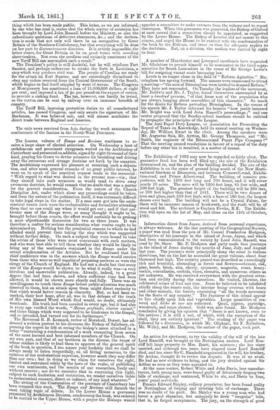The famous volume of Essays and Reviews continues to re-
ceive a large share of clerical attention. On Wednesday a host of archdeacons and prominent clergymen waited on the Archbishop of Canterbury and presented an address, signed by eight thousand of their kind, praying his Grace to devise measures for banishing and driving away the erroneous and strange doctrine set forth by the essayists. The Archbishop expressed his pleasure at receiving such a deputa- tion, and after some general remarks of no great public interest, he went on to speak of the practical request made in the memorial: "With regard to what was desired in the present case—viz., that they should take such measures as would ten& to drive away erroneous doctrine, he would remark that no doubt that was a matter for the gravest consideration. From the nature of the Church Discipline Act, under which alone any proceedings could be taken, and from the nature of the publication itself, it was extremely- difficult to take legal steps in. the matter. If a case once got into the eccle- siastical courts such were the technicalities and formalities attending -them that no one could say when it would get out ; and if that par- ticular case of the Essays were, as many thought it ought to be, brought before those courts, the effect would certainly be to prolong a most objectionable discussion for two or three years. 'It was therefore a matter for serious consideration what course ought to be determined on. Nothing but the prudential reasons to which he had alluded could prevent their taking the step which was suggested without further delay. On such a subject they were bound to take the advice of those who were most conversant with such matters, and who were best able to tell them whether they would be likely to bring any of the sentiments contained in the Essays under the actual condemnation of the Articles. But he confessed that his chief confidence was in the answers which the Aways would receive from those who were so well capable of preparing answers as were the clergy of the Church of England. He had not a doubt but that every one of the Essays would be shown to be what it really was—a very frivolous and answerable publication. Already, indeed, to a great degree that had been shown, and when sufficient time had been allowed, it would be shown more clearly and fully. There was an unwillingness to touch these Essays before public attention was much directed to them, lest an attack upon them might direct curiosity to that which would better remain in obscurity. But, as had been re- marked, their best hope, after all, was in that defence of the truth of His own blessed Word which God would, no doubt, ultimately vouchsafe. His truth had been assailed in every age, but it had also in every age verified the words, "Merses profundo, elarior mind," and those things which were supposed to be hindrance to the Gospel, and so intended, had turned out for its furtherance."
The Reverend R. B. Kennard, rector of Marnhull, Dorset, has ad- dressed a written protest to his diocesan the Bishop of Salisbury, ex- pressing the regret he felt at seeing the bishop's name attached to a letter "containing a condemnation of a work emanating from seven of the most learned and best informed members of the Church. On my own part, and that of my brethren in the diocese, the range of whose studies is likely to lead them to approve of the general spirit of the book in question, I can assure your lordship that we shall be always ready to listen respectfully, on all fitting occasions, to the opinions of our ecclesiastical superiors, however much they may differ from our own; but in doing so we claim for ourselves the right, limited and restrained solely by the laws of the realm, of publishing our own sentiments, and the results of our researches, freely and without reserve ; nor do we conceive that in exercising this right, subject to such limitation and restriction, we render ourselves liable to ecclesiastical censure, direct or indirect, of any kind whatever." The sitting of the Convocation of the province of Canterbury has been resumed this week. The Essays and Reviews still furnish the most taking topic of debate. In the Lower House a gravamen presented by Archdeacon Denison, condemning the book, was ordered to be carried to the Upper House, with a prayer the Bishops would appoint a committee to make extracts from the volume and to report thereupon. When this gravamen was presented, the Bishop of Oxford at once moved that a committee should be appointed, as suggested by the Lower House. The Bishop of London did not assent to this course, and urged the House to be content with the condemnation of the book by the Bishops, and trust to time for adequate replies to the doctrines. But, on a division, the motion was carried by eight to four.






























 Previous page
Previous page